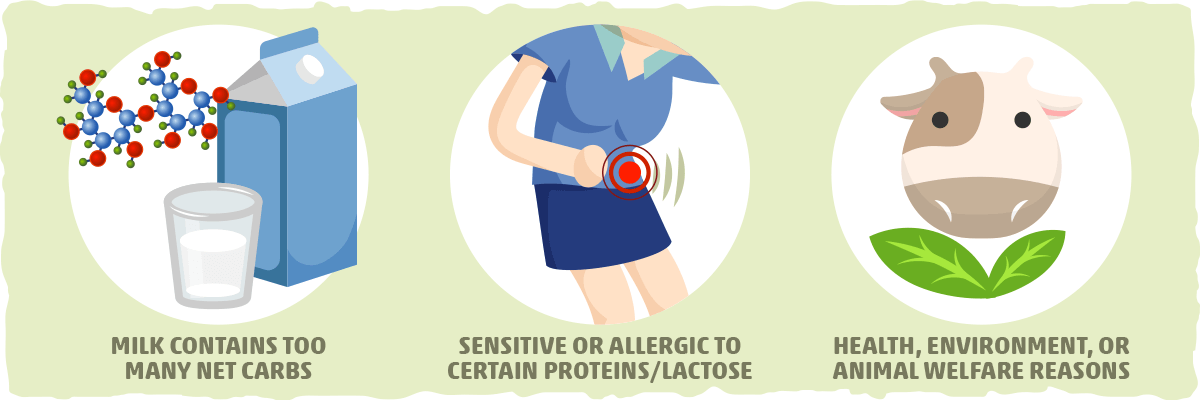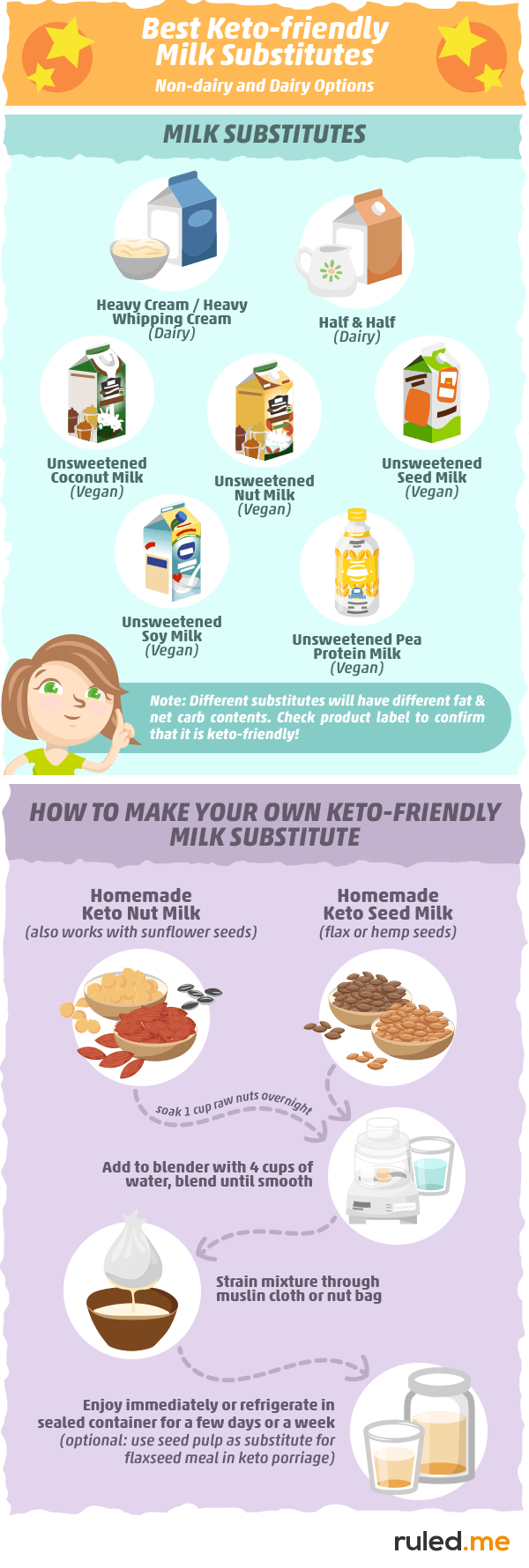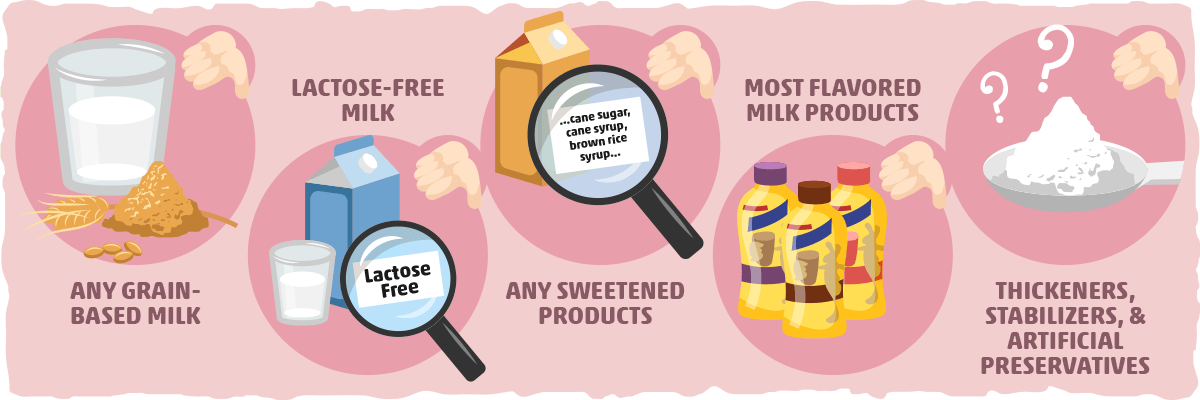With all of the butter, cheese, and heavy cream you can eat on the keto diet, it is easy to forget that dairy milk is packed with carbs and sugar (from lactose). Because of this, milk is not a good drink to have on keto.
This rings true for ALL dairy milks — including whole, 1%, 2%, and skim — each one being far from keto-friendly. That being said, there are plenty of low-carb milk alternatives you can easily find in any grocery store.
Whether you want to cut carbs or dairy from your diet, you’ll be able to find the perfect keto milk substitute for your needs. In fact, even evaporated milk and sweetened condensed milk can be replaced with a keto-approved option that will help you overall improve health and reach your fat loss goals.
To help you find the best keto milk substitute for you, we broke this post into the following sections:
- Why substitute milk on keto?
- Keto-friendly milk substitutes: dairy and non-dairy options
- How to make your own
- How to replace milk in recipes
- Milk substitutes you should avoid on keto
- Evaporated milk, sweetened condensed milk, and their keto-friendly substitutes
- Key takeaways and keto diet resources
Why Substitute Milk on Keto?

There are three primary reasons why you may find it helpful to limit milk consumption as you follow a keto lifestyle:
1. Milk contains too many net carbs.
Milk naturally contains high amounts of lactose, which is broken down into simple sugars in the gut by the lactase enzyme. Unfortunately, even a cup of whole milk (the highest fat dairy milk) will come with 11 grams of net carbs.
In the context of a keto diet, milk can only be used sparingly. Just by having a glass of milk with your breakfast, you can eat up almost half of your net carb limit (which is typically around 25 grams per day) while also restricting your food choices for the rest of the day.
That being said, you can still use whole milk in small amounts in your keto recipes, coffee, or tea since one tablespoon of whole milk only has ~0.7 grams of net carbs.
Keep in mind, however, that there is a wide array of keto-friendly milk substitutes that will be much easier to fit into your diet regardless of how much you consume. We’ll explore these options in the next section.
2. Milk contains lactose and particular proteins you may be sensitive to or allergic to.
If you cannot tolerate dairy products for any reason, the keto diet will seem like a daunting task with its heavy reliance on dairy products like cheese and heavy cream. Fortunately, there are more dairy-free milk alternatives than those that are dairy-based.
In this guide, we will provide you with the dairy-free options you can rely on. However, if you’d like to limit your intake of ALL dairy products, you’ll find more comprehensive information in our guide to dairy-free keto.
3. You are looking to limit the consumption of animal products altogether.
Whether it is for the sake of your health, the environment, or animal welfare, there are plenty of milk substitutes that are both keto-friendly and 100% vegan. Continue reading below for a comprehensive list of these options (and check out our guide to the vegan keto diet if you are looking to transition to a more plant-based keto lifestyle).
Best Keto Milk Substitutes : Non-dairy and Dairy Options
In general, the best alternatives will be either a high-fat dairy product or an unsweetened plant-based milk made from nuts, seeds, peas, and/or soy. In both cases, the product should have the same consistency as milk with a small fraction of the net carbs.

Keto-friendly, dairy-based milk substitutes*:
- Heavy cream or heavy whipping cream — This will be the highest fat dairy option for the keto lifestyle.
- Half & half — Being a mix of half milk and half cream, this is also a great alternative for whole milk. Keep in mind that it will be a bit lower in fat than heavy cream.
Dairy-free, vegan milk substitutes for keto*:
- Unsweetened coconut milk — Pure coconut milk (i.e., the ingredients are coconut and water) is the highest-fat vegan-friendly milk replacement. Some examples of the best options are Native Forest Organic Coconut Milk and Aroy-D Coconut Milk. Goya Coconut Milk and So Delicious Unsweetened Coconut Milk are good keto-friendly options as well (if you don’t mind the extra ingredients).
- Unsweetened nut milk — You can find a vegan keto milk substitute made from virtually any nut. “Milk” made from almonds, cashews, walnuts, macadamias, and even hazelnuts can be found online or on the shelves. Look for the products with the shortest ingredients list and less than 2 grams of net carbs per cup. Elmhurst unsweetened nut milk, So Delicious unsweetened nut milk, and Milkadamia unsweetened macadamia milk are some examples of widely available low-carb options. Just make sure to double-check the label, since each brand has sweetened high-carb products as well.
- Unsweetened seed milk — Flax milk and hemp milk are the two easiest-to-find keto substitutes for anyone with nut and dairy allergies. Read the ingredients label carefully as these products tend to contain other carb-rich ingredients. Look for the flax or hemp milk products with less than 2 grams of net carbs per cup. The best examples of this are Pacific Foods Unsweetened Hemp Milk and Good Karma Unsweetened Flaxmilk (which can both typically be found in Walmart).
- Unsweetened soy milk — Though most soy milk products are far from low-carb, there are several keto-friendly options available. Look for unsweetened organic soy milk, and double-check the nutrition label. It should have no more than 2 grams of net carbs per cup. The most widely-available example of this is Silk Organic Unsweetened Soy Milk.
- Unsweetened pea protein milk — Whether it’s called pea milk or plant protein milk, the featured ingredient will be pea protein. Ripple Unsweetened Original Plant-based Milk is the most popular keto-approved example of this. It is a great choice for anyone who wants a keto milk substitute that is dairy-free, nut-free, vegan-friendly, and high in protein. Unfortunately, not all pea milk products are keto-friendly, so carefully read the label before use.
If you’re not avoiding dairy, then a great option to get a higher fat content milk substitute with a fuller mouthfeel is a mixture of nut milk and heavy cream. Simply combine heavy whipping cream with a nut or seed milk of your choice. A tasty way to do this is to use about 80% nut or seed milk and 20% heavy cream. For example, to replace a cup of whole milk, you can use 190ml almond milk and 50ml heavy cream.
*Before purchasing any of these options, make sure you check the net carbs, ingredients, and serving size to verify that the product is keto-friendly for you.
How to Make Your Own Keto-friendly Milk Substitute
Sorting through the litany of milk alternatives on grocery store shelves (and online listings) can be stressful. If you are struggling to find a keto milk substitute you can rely on, try making it yourself.
For Homemade Keto Nut Milk (also works with sunflower seeds):
- Soak 1 cup of raw nut overnight.
- Rinse the nuts and add to your blender with 4 cups of filtered water.
- Blend until smooth.
- Drain mixture through a muslin cloth or nut bag.
- Squeeze out the almond milk from the almond meal pulp.
- Enjoy immediately or store in an airtight container for 3-5 days.
For Homemade Keto Seed Milk (Flax or Hemp):
- Add ½ cup of seeds and 4 cups of water to your blender.
- Blend until smooth.
- Carefully strain the mixture through a muslin cloth or nut bag and discard the pulp (or use it as a substitute from flaxseed meal in vegan keto porridge).
- Enjoy immediately or store the milk in a sealed container in the fridge for up to a week.
Keto-friendly flavoring options for homemade nut or seed milk:
- Use a teaspoon of sugar-free vanilla extract for vanilla flavoring.
- Blend in your favorite keto sweetener to preferred sweetness.
- Blend in pure cocoa powder for a keto-friendly chocolate milk substitute.
- Add cinnamon, ground ginger, pumpkin pie spice mix, and/or other spices.
- Add a pinch of salt.
How to Replace Milk with Your Preferred Keto Milk Substitute
Regardless of the milk alternative you choose from the options above, use a 1:1 substitution ratio when replacing the milk for most recipes. For example, if a recipe calls for two tablespoons of milk, simply use two tablespoons of your preferred alternative.
As with most keto-friendly replacements, however, there are a few things to keep in mind for an optimal end result:
- Make sure your keto milk substitute is homogenous (i.e., it shouldn’t have any particles or separation between water and fat).
- Consider the flavor and fat content of your milk alternative. In general, the higher fat substitutes will add satisfying richness, while the lower-fat options will tend to water down some of the flavors in the recipe.
- Try to mirror what the recipe calls for. If the recipe calls for low-fat milk, use half and half, light coconut milk, or any other lower-fat keto milk alternative. Conversely, when the recipe calls for whole milk, try using heavy cream, full-fat coconut milk, or high-fat nut milk.
- Consider the differences in macronutrients for accurate tracking. The protein, fat, and carb content of milk vs. your milk substitute will vary significantly. Make sure you take this into account to increase your chances of success with keto. For a deeper dive into tracking your food and carb intake, check out our guide on the topic.
What About Coconut Milk and Almond Milk Substitutes?
The same caveats from the previous section apply to virtually any milk substitute you want to use or replace. As with regular milk, use a substitution ratio of 1:1 and try to use a product with similar fat content and flavor profile.
Since most keto recipes will call for full-fat coconut milk, the best keto coconut milk substitute will be a higher fat milk alternative like heavy cream or a high-fat nut milk product (two-ingredient nut milks tend to have the highest fat content).
Milk Alternatives to Avoid on Keto: Common Ingredients and Products

Now that we know what to use and how to use it, let’s take a look at what should be avoided on keto:
- Any variety of grain-based milk — Oat milk and rice milk, in particular, tend to have more net carbs than regular milk, even in their purest form.
- Lactose-free milk — Unfortunately, this doesn’t mean that the carbs are removed from the milk. Instead, the milk sugar (lactose) is converted into sugars that are even easier to digest.
- Any sweetened products — Make sure the product is unsweetened with keto-friendly ingredients. Avoid the product if you see ingredients like cane sugar, cane syrup, dried cane syrup, evaporated cane juice, or brown rice syrup.
- Most flavored milk products — Flavoring is usually accompanied by sweetener. That being said, there are several unsweetened vanilla milk alternatives that are keto-friendly.
- Chemical thickeners, stabilizers, and artificial preservatives — A common strategy that companies use to cut down on costs is using a handful of cheaper ingredients that mimic different aspects of milk. Although these additives are typically safe in small doses, they can cause digestive discomfort for some. In most cases, it is best to use milk substitutes with one or two ingredients.
Evaporated Milk, Sweetened Condensed Milk, and Their Low-carb Substitutes
Simply put, evaporated milk is milk that has been boiled down to remove some of the water content, and sweetened condensed milk is evaporated milk with added sweetener.
Both are concentrated sources of simple sugar that will slow your keto progress. Fortunately, there are a few keto-friendly replacements you can use for these unhealthy options.
Evaporated Milk Substitutes for Keto
Since evaporated milk is just milk with less water content, there are plenty of easy substitution options you can buy or make yourself.
- Full-fat coconut milk — This will impart a coconut flavor to the recipe, which will work well with most desserts and curries.
- Heavy cream — The most versatile evaporated milk substitute: It works well in sauces, soups, pie fillings, baking, casseroles, frozen desserts, and custards.
- Half & half — A great option if heavy cream is too rich for the recipe.
- Any vegan milk after reducing it down by ~60% — You can make evaporated milk at home by simmering your preferred vegan-friendly milk alternative until you have 40% of the amount you started with.
These options can be used as a 1:1 replacement for evaporated milk, but make sure you read the tips next to each one to find the ideal substitute for your keto recipe.
Sweetened Condensed Milk Substitute for Keto
At around 8 grams of net carbs per tablespoon, sweetened condensed milk is far from being keto-friendly. To find a good substitute that mimics the flavor without the added sugar, your options are much more limited than with evaporated milk.
Your best option is to make it yourself. All you’ll need is heavy whipping cream, salted butter, allulose, and granulated erythritol to make a high-fat, sugar-free substitute that mimics every aspect of the original product. (Plus, you can use these ingredients to make keto-friendly sauces, desserts, muffins, and pancakes as well.) To get started, check out our sweetened condensed milk recipe page.
Key Takeaways — Milk, Keto Milk Substitutes, and the Keto Diet
When it comes to traditional milk, it’s high enough in carbs that you should only use it sparingly or avoid it altogether. Fortunately, there are plenty of keto-friendly milk substitutes to choose from:
Dairy-based milk alternatives*:
- Heavy cream or heavy whipping cream
- Half and half
Dairy-free, vegan milk substitutes*:
- coconut milk
- nut milk (i.e., made from almonds, cashews, macadamia, walnuts, and/or hazelnut)
- hemp milk
- flax milk
- soy milk
- pea protein milk
An 80/20 mixture of heavy cream and dairy-free milk can also provide higher fat content and realistic mouthfeel.
*When buying these keto milk substitutes, go for unsweetened, higher-fat varieties and avoid the sweetened products. Double-check to make sure it contains net carbs and ingredients that are keto-friendly for you.
With these low-carb milk substitutes, you can make creamy smoothies, low-carb cereal, and your favorite keto desserts while you reap the benefits of the keto lifestyle.
As with other keto foods and beverages, it is important to keep what you consume in the context of your overall diet and lifestyle. To help you maximize your chance of success with keto, we’ve included some helpful guides and tools below:
- A Beginner’s Guide to The Keto Diet
- How to Go 100% Dairy-free on the Keto Diet
- A Comprehensive Guide to Vegan Keto
- The Ketogenic Diet Calculator (personalize your fat, protein, and carb intake to help you meet your goals)
